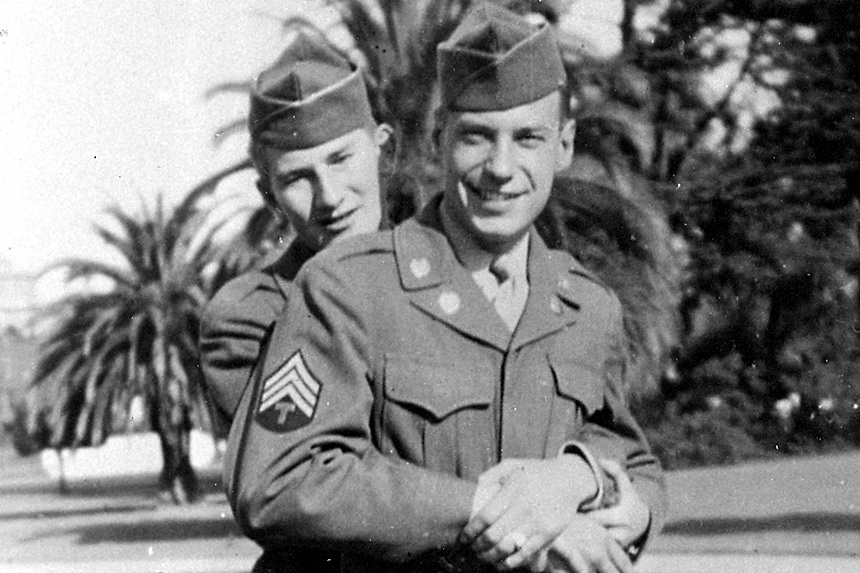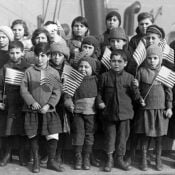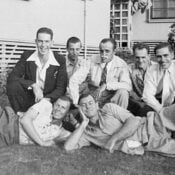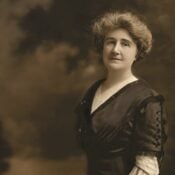This series by American studies professor Ben Railton explores the connections between America’s past and present.
Earlier this month, Secretary of Defense Pete Hegseth ordered the secretary of the Navy to change the name of the USNS Harvey Milk, a fleet replenishment oiler ship named after the former San Francisco mayor and LGBTQ+ rights activist. The same documents suggest that a number of other ships named for civil rights leaders are likewise on the renaming “recommended list,” including the USNS Thurgood Marshall, the USNS Dolores Huerta, and the USNS Lucy Stone. Navy officials have also confirmed that changing the name of the Harvey Milk was specifically and intentionally timed to take place during Pride Month.

There’s a striking irony to that timing: Long before he was a politician and an activist, Harvey Milk was a U.S. Navy veteran, having served aboard the rescue submarines the USS Chanticleer and USS Kittiwake during the Korean War (and continuing as a diving instructor in San Diego after the war’s end, until he was forced to accept an “Other Than Honorable” discharge due to his sexuality). He’s one of countless LGBTQ+ Americans to have served in the armed forces throughout our history, including during every one of our wars, despite facing the same kinds of discrimination and challenges that Milk experienced. Remembering some of those inspiring individuals and stories is particularly important during this Pride Month.

As we continue to commemorate the 250th anniversary of the opening salvos of the American Revolution, I’ll begin by noting that there might not be a United States at all if it weren’t for the help of a gay military officer: Baron Friedrich von Steuben, the German-born general who became one of the leading drill and strategy instructors for the Continental Army. As this article notes, von Steuben’s sexuality was not widely nor publicly known, but the historical evidence suggests that he was indeed gay. And he was unfortunately not wrong to keep his sexuality private, as illustrated by the case of Lieutenant Frederick Gotthold Enslin, who was court-martialed and dismissed from the Continental Army in 1778 for “attempting to commit sodomy.”

Such consequences, which continued well into the 20th century, meant that LGBTQ+ military members had to keep their sexuality private and hidden if they were to serve in the armed forces, and so we have to search through letters, diaries, and similar archival documents to find information on these soldiers’ personal lives. For example, in his book The Story the Soldiers Wouldn’t Tell: Sex in the Civil War (2012), the physician and historian Thomas P. Lowry highlights a letter from a Massachusetts soldier stationed in Virginia who describes an 1864 dance at which regimental drummer boys were dressed as women: “Some of the real women went, but the boy-girls were so much better looking that they left…Some of [the Drummer boys] looked good enough to lay with and I guess some of them did get laid with…I know I slept with mine.”
While the sexuality of most 19th and early 20th century LGBTQ+ military members remained private until after their death, one who served in the Army during World War I became a leading public advocate for the community after his return home. That was Henry Gerber (1892-1972), the German immigrant who would found the groundbreaking Society for Human Rights in Chicago in 1924. Having spent time in a mental institution in 1917 due to his sexuality and in danger of being defined as an “enemy alien” due to his German heritage, Gerber chose to enlist when the U.S. entered the First World War. He returned to Germany and worked as a printer and proofreader with the Allied Army of Occupation in Koblenz, where he became connected to Germany’s gay subculture and began to develop the ideas that would lead to his lifelong activism.

Beginning with the Second World War, the experiences of LGBTQ+ military members began to be captured more regularly through personal narratives and oral history projects, such as the groundbreaking Veterans History Project maintained by the Library of Congress. There we find the story of Franklin Kameny, whose service in World War II was only the beginning of a lifetime of public service and advocacy for fellow LGBTQ+ Americans. Or Nathaniel Glover Butler, who lied about his sexuality in order to join the Navy during the Vietnam War, where he served with distinction aboard the USS Ticonderoga. Or Elizabeth Lutes Hillman, whose time in the Air Force during the Gulf War led her to work for the Strategic Defense Initiative and in military justice as a lawyer. Or JaeLee Waldschmidt, who was stationed on the submarine USS Hawaii during the Second Iraq War before her identity as a trans woman led her to leave the service and join LGBTQ+ advocacy groups.

Here in a moment when trans Americans are under particular assault from the administration and so many discriminatory forces, I have to end by highlighting another, contemporary transgender military member whom I’ve had the privilege to get to know through my public scholarly work on patriotism. Shawn Skelly served as an active-duty Naval officer for 20 years, including time as a pilot, a counterterrorism expert, and a training officer for other Naval Flight Officers. She’s since moved into a number of governmental roles with both the Obama and Biden administrations, most recently as assistant secretary of defense for readiness under Biden. And she is also a co-founder of Out in National Security, a non-profit organization working to support LGBTQ+ community members serving in a variety of roles.

In 2019, Skelly spoke with Gay City News about President Trump’s attempts to ban transgender military members, calling those efforts “the most prominent part of a broader administration campaign to drive transgender people out of the mainstream of American society through the deliberate removal of legal recognition and protections of every sort.” That campaign has returned and expanded to all LGBTQ+ Americans with this second Trump administration, as illustrated symbolically by the Harvey Milk name change. This Pride Month, we can challenge such efforts by remembering and celebrating Shawn Skelly and all the LGBTQ+ Americans who have served in our armed forces.
Become a Saturday Evening Post member and enjoy unlimited access. Subscribe now




Comments
PS. On a different note, I just learned that Rock Hudson served in the Navy during WWII, so I wanted to add him to this column’s list of figures and stories!
Ben
The editors are likely to delete Midnight’s comment pretty soon, as they should, as its hateful language is exceeded only by its hateful content. To say nothing of its thoroughgoing ignorance, natch.
But I just want to say that I greatly appreciate your comment, Marjorie. Love and inclusion are just as important to challenging hate as knowledge and education, and I very much like when my columns here can model both in the comments section as well as the content.
Ben
I am a little old lady in Texas who believes humans should live in harmony. People who fear others because they are different, whether it be homosexuals, left-handers, black haired or black skinned, are being ridiculous. How is a homosexual going to hurt you? What is it you fear? Why do you care so much how and why others live? Would you fear an American Indian? How about a Swedish American? A woman with one leg? A man with red lips? What sense would any of that make?
I’m sorry that you’re afraid of other people, but you’re not obligated to have friends who are different. You are just supposed to leave others alone and mind your own business.